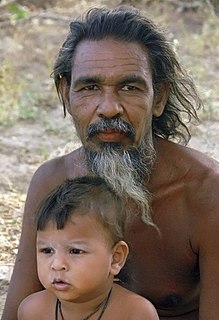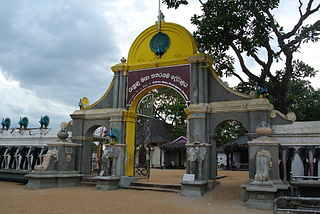Vedda may refer to:
- the Vedda people
- the Vedda language
| This disambiguation page lists articles associated with the title Vedda. If an internal link led you here, you may wish to change the link to point directly to the intended article. |
Vedda may refer to:
| This disambiguation page lists articles associated with the title Vedda. If an internal link led you here, you may wish to change the link to point directly to the intended article. |

The Vedda are a minority indigenous group of people in Sri Lanka who, among other self-identified native communities such as Coast Veddas, Anuradhapura Veddas and Bintenne Veddas, are accorded indigenous status. The Vedda minority in Sri Lanka is in threat of becoming extinct. Most speak Sinhala instead of their indigenous languages which are nearing extinction.

Sinhala, also known as Sinhalese, is an Indo-Aryan language primarily spoken by the Sinhalese people of Sri Lanka, who make up the largest ethnic group on the island, numbering about 16 million. Sinhala is also spoken as the first language by other ethnic groups in Sri Lanka, totalling about four million. Sinhala is written using the Sinhala script, which is one of the Brahmic scripts, a descendant of the ancient Indian Brahmi script closely related to the Kadamba script.
Kuveni(කුවේණි / குவேனி) also known as Sesapathi or Kuvanna, was a Yakshini queen in Sri Lanka mentioned in the ancient Pali chronicles Mahavamsa and Dipavamsa of the Sinhalese people. The primary source for her life-story is the Mahavamsa. She is venerated as Maha Loku Kiriammaleththo by the Veddas. Other names for her varying with Veddas habitats are Indigolle Kiriamma, Unapane Kiriamma, Kande Kiriamma, Divas Kiriamma, Wellasse Kiriamma, Kukulapola Kiriamma and Bili Kiriamma.

Badulla is a district in Uva Province, Sri Lanka. The entire land area of the Badulla district is 2,861 km² and total population is 837,000. The district is bounded by the districts of Monaragala and Rathnapura on the East & South, by Ampara and Kandy districts on the North and by Nuwara Eliya and Matale on the West. Mainly the economy of the district is based on agricultural farming and livestock.
Yakka may refer to:
Dimbulagala also known as Gunners Rock during the British colonial period, is a rock formation in the Polonnaruwa District of Sri Lanka. By the time anthropologist Charles Gabriel Seligman visited the location in 1911, a cave within the rock had become a refuge of the indigenous Vedda people. During the 12th century AD, The Sinhalese people had constructed a Buddhist monastery within the rock formation. The Dimbulagala Raja Maha Vihara monastery was restored in the 1950s. The villagers around the rock are of mixed Vedda and Sinhalese ancestry.
Balangoda Man refers to hominins from Sri Lanka's late Quaternary period. The term was initially coined to refer to anatomically modern Homo sapiens from sites near Balangoda that were responsible for the island's Mesolithic 'Balangoda Culture'. The earliest evidence of Balangoda Man from archaeological sequences at caves and other sites dates back to 38,000 BP, and from excavated skeletal remains to 30,000 BP, which is also the earliest reliably dated record of anatomically modern humans in South Asia. Cultural remains discovered alongside the skeletal fragments include geometric microliths dating to 28,500 BP, which together with some sites in Africa is the earliest record of such stone tools.
The Sinhala Hound or Sinhalese Hound is a breed of dog from Sri Lanka, and parts of India.
Vedda is an endangered language which is used by the indigenous Vedda people of Sri Lanka. Additionally, communities such as Coast Veddas and Anuradhapura Veddas who do not strictly identify as Veddas also use words from the Vedda language in part for communication during hunting and/or for religious chants, throughout the island.
African Sri Lankans, mainly the Sri Lanka Kaffirs, are a very small Ethnic group in Sri Lanka who are descendants of African mercenaries, musicians, and labourers taken to what is now Sri Lanka by Portuguese colonists during the period of Portuguese colonial rule on the island. There are currently around 1000 African Sri Lankans. They live in pockets of communities along the island's coastal regions of Trincomalee, Batticaloa and Negombo. The Portuguese colonists used them to fight the Ceylonese Kings.

The Coast Veddas, by self-designation, form a social group within the minority Sri Lankan Tamil ethnic group of the Eastern province of Sri Lanka. They are primarily found in small coastal villages from the eastern township of Trincomalee to Batticalao. Nevertheless, they also inhabit a few villages south of Batticalao as well. They make a living by fishing, slash and burn agriculture, paddy cultivation of rice, basket weaving for market and occasional wage labor. Anthropologists consider them to be partly descended from the indigenous Vedda people, as well as local Tamils. Residents of the Eastern province consider their Vedar neighbors to have been part of the local social structure from earliest times, whereas some Vedar elders believe that their ancestors may have migrated from the interior at some time in the past.
Richard Lionel Spittel, was a Ceylonese Burgher physician and author. He was one of the foremost experts on the Vedda community.

Maduru Oya National Park is a national park of Sri Lanka, established under the Mahaweli development project and also acts as a catchment of the Maduru Oya Reservoir. The park was designated on 9 November 1983. Providing a sanctuary to wildlife, especially for elephants and protecting the immediate catchments of five reservoirs are the importance of the park. A community of Vedda people, the indigenous ethnic group of Sri Lanka lives within the park boundary in Henanigala. The park is situated 288 kilometres (179 mi) north-east of Colombo.

Kataragama temple in Kataragama, Sri Lanka, is a temple complex dedicated to Buddhist guardian deity Kataragama deviyo and Hindu War God Murugan. It is one of the few religious sites in Sri Lanka that is venerated by the Buddhists, Hindus, Muslims and the Vedda people. For most of the past millennia, it was a jungle shrine very difficult to access; today it is accessible by an all-weather road. The shrines and the nearby Kiri Vehera are managed by Buddhists, the shrines dedicated to Teyvāṉai and Shiva are managed by Hindus and the mosque by Muslims.

Kataragama is a pilgrimage town sacred to Buddhist, Hindu and indigenous Vedda people of Sri Lanka. People from South India also go there to worship. The town has the Kataragama temple, a shrine dedicated to Skanda Kumara also known as Kataragama deviyo. Kataragama is located in the Monaragala District of Uva province, Sri Lanka. It is 228 km ESE of Colombo, the capital of Sri Lanka. Although Kataragama was a small village in medieval times, today it is a fast-developing township surrounded by jungle in the southeastern region of Sri Lanka.
Anuradhapura Veddas are people of North Central Province of Sri Lanka who are descendants of indigenous Vedda people of Sri Lanka who have adopted the culture, religion and language of the dominant Sinhalese residents of the province. By far they are the largest segment amongst the various groups of people who claim Vedda ancestry. They are also ethnically related to Tamil speaking Coast Veddas who live in the minority Sri Lankan Tamil dominant Northern Province of Sri Lanka who have adopted Tamil and Hindu cultural norms of their neighbors. Settlements of Anuradhapura Veddas also spread into the neighboring Polonnaruwa District and a few villages in the interior of the Trincomalee District.
Wesleyan Methodist Mission, North Ceylon was formed as part of the Wesleyan Methodist Mission of Ceylon, the oldest Weslyan Mission to be established in East in 1814. The North Ceylon Mission was established to specifically cater to the Tamil speaking Sri Lankans in Jaffna, Trincomalee and Batticaloa where Methodist Missionaries established number of schools and churches. It also catered to the indigenous Vedda people.
Calyptomyrmex vedda is a species of ant in the subfamily Myrmicinae, which can be found in Sri Lanka.
Dambana, a village within the Badulla District in Sri Lanka. It is closest to the town of Mahiyangana. It is known as the refuge of the indigenous Vedda people as well as their moribund Vedda language. It is well known for its eco-tourism projects, operated by Eco Team. In 2010 it had population close 1000 individuals all belonging to Vedda families.

Brenda Zara Seligman born Brenda Zara Salaman was a British anthropologist who was the winner of Rivers Memorial Medal in 1933 for her work over five years in the field. She was married to Charles Seligman who has overshadowed her contribution. He died in 1940 and she continued to extend their private museum collections. She rose to be vice-President of the Royal Anthropological Institute and to leave vast collections to leading British museums.